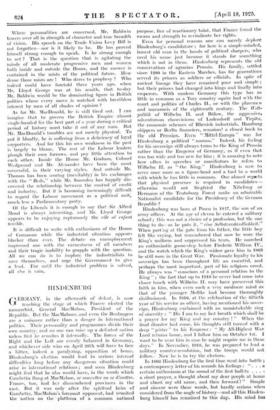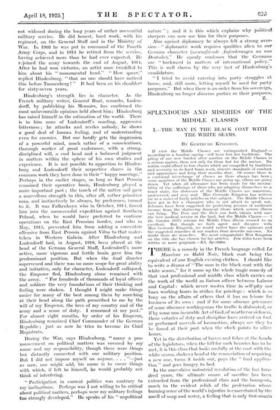III NDIENBURG
0.ERMANY, in the aftermath of defeat, is now X--X reaching the stage at which France elected the monarchist, General MacMalion, President of the Republic. But the MaeMahons, and even the Boulangers are a nuisance rather than a danger in international polities. Their. personality and programmes divide their own country, and no one can raise up a defeated nation. unless first he reunites it internally. The forces of the Right and the Left are evenly balanced in Germany, and whichever side wins on April 26th will have to face a bitter, indeed a paralyzing, opposition at home. Hindenburg's election would lead to serious internal difficulties long before any dangerous situation could arise in international relations ; and soon Hindenburg might find that he also would have, in the words which Gambetta flung at MacMahon, se sounecttre au se dbnettre. France, too, had her dismembered provinces in the east. But it was only after the spiritual heirs of Gambettn, MacMahon's foremost opponent, had reunited the 'nation on the platform of a common national purpose, free of reactionary taint, that France found the means and, strength to re-vindicate her rights.
Even for personal reasons one can merely deplore Hindenburg's candidature ; for here is a simple-minded, honest old man in the hands of political sharpers, who need his name just because it stands for something which is not in them. Hindenburg represents the old conservatism of agrarian Prussia. His family, settled since. 1280 in the Eastern Marches, has for generations. served its princes as soldiers or officials. In spite of ancient lineage they have remained poor and simple ; but their princes had changed into kings and finally into emperors. With modern Germany this type has as little in common as a Tory country squire had with the court and politics of Charles II., or with the placemen and macaronis of the eighteenth century. The Welt politik of Wilhelm II. and Billow, the aggressive, adventurous chauvinisms of Ludendorff and Tirpitz, the economic schemes of Rhenish industrials, Hamburg shippers or Berlin financiers, remained a closed book to the old Prussian. Even " Mittel-Europa " was for Hindenburg a political " morass." Indeed, his feeling for his sovereign still always turns to the King of Prussia rather than the Emperor of Germany, as if even that was too wide and too new for him ; it is amazing to note how often in speeches or manifestoes he refers to Wilhelm II. as "the King.!' Hindenburg is now to serve once more as a figure-head and a tool to a world with which he has little in common. One almost regicta that physical presence is required in candidates— otherwise would not Siegfried the Nibelung or Hermann of the Teutoburg Forest make an admirable Nationalist candidate for the Presidency of the German Republic ?
Hindenburg was born at Posen in 1841, the son of an army officer. At the age of eleven he entered a military school ; this was not a choice of a profession, but the one thing to do—as he puts it, "clue Selbstverstlindlichkeit.'! When part:11g at the gate from his father, the little boy felt like crying, but remembered that now he wore the King's uniform and suppressed his tears. He marched an enthusiastic goose-step before Frederic William IV., and the watch which the King's widow gave him in 1863 he still wore in the Great War. Passionate loyalty to his sovereign has been throughout life an essential, and perhaps the most important, part Of his religious creed. He -always was "conscious of a personal relation to the King" ; the fact that up to 1916 he never had come into closer touch with Wilhelm IL may have preserved this faith in him, when even such a very mediocre mind aS that of the younger Moltke had become thoroughly disillusioned. In 1916, at the celebration of the fiftieth year of his service as officer, having mentioned his sover eign, Hindenburg exclaimed with an unmistakable ring of sincerity : " His I am to my last breath which shall be a prayer for my King and my country ! " When the final disaster had come, his thoughts still turned with deep "pietas" to his Emperor : " My All-Highest WO. Lord returns home, and I follow him on October 1st. I want to be near him in ease he might require me in these days." In November, 1918, he was prepared to lead a military counter-revolution, but the troops would not follow. Now he is to try the electors. .
In 1866 Hindenburg for the first time went into battle ; a contemporary letter of his records his feelings.: " . . . a certain enthusiasm at the sound of the first bullets . . .
a short prayer, a thought about my dear people at home and about my old name, and then forward,!" Simple and sincere were these words, but hardly serious when considered from the angle of history—and all this Hindenburg himself has remained to this day. Ms mind has not widened during the long years of rather uneventful Military service. He did honest, hard work, with his regiment, on the General Staff and in the Ministry of War. In 1903 he Was put in command of the Fourth Array Corps, and in 1911 he retired from the service; having achieved more than he had ever expected. He rejoined the army towards the end of August, 1914. After he had won victories, an artist once tWaddled to him about his "monumental head." "How queer," replied Hindenburg, "that no one should have noticed this before Tannenberg ! " It had been on his shoulders for sixty-seven years.
Hindenburg's strength lies in character. As the French .military writer, General Buat, remarks, Ludendorff, by publishing his Memoirs, has confirmed the most unfavourable opinions held about him ; Hindenburg has raised himself in the estimation of the world. There is in him none of Ludendorff's snarling, aggressive bitterness ; he attacks and reviles nobody, he shows a good deal of human feeling, and of understanding even for enemies. But one hardly gets the impression of a powerful mind, much rather of a conscientious, thorough worker of great endurance, with a strong, disciplined will, a cool head and a balanced judgment in matters within the sphere of his own studies and experience. It is not possible to apportion to Hindenburg and Ludendorff their respective shares in the common work they have done in their" happy marriage." Perhaps in the earlier stages, so long as East Prussia remained their operative basis, Hindenburg played a more important part ; the touch of the native soil gave a marvellous strength to this, after all, rather primitive man, and instinctively he always, by preference, turned to it. It was Falkenhayn who in October, 1914, forced him into the unsuccessful expedition against Southern Poland, when he would have preferred to continue operations on the East Prussian border, and who in May, 1915, prevented him from adding a concentric offensive from East Prussia against Vilna to that under' taken in Western Galicia. After Hindenburg and Ludendorff had, in August, 1916, been placed at the head of the German General Staff, Ludendorff's more active, more vigorous and fertile brain gave him the predominant position. But when the final disaster supervened and there was. no more scope for great ability and initiative, only for character, .Ludendorff collapsed, -the Emperor fled, Hindenburg alone remained with the army. "For hundreds of thousands of loyal officers and soldiers the very foundations of. their thinking and feeling were shaken. I . thought I might make things easier for many of the best among them by marching at their head along the path prescribed to me by the will of my Emperor, the love of my country and of the army and a sense of duty. . I remained at my post." For almost eight months, by order of his Emperor, Hindenburg remained Chief Commander of the German Republic ; just as now he tries to become its Chief Magistrate.
During the War, says Hindenburg, "many a pronouncement on political matters was covered by my -name and my responsibility, though these were things but distantly connected with our military position. But I did not impose myself on anyone. . . . "—just as now, one might add, his name is to cover things with which, if left to himself, he would probably not think of interfering.
"Participation in current politics was contrary to My. inclinations. Perhaps was I not willing to be critical about political matters, perhaps were my military feelings -too strongly developed." He speaks of his "unpolitical nature " ; and it is this which explains why political sharpers can now use him for their purposes.
Also against diplomacy he always felt a strong aversion—" diplomatic work requires qualities alien to our German character (wesens)einde Anforderungen an uns. Deutsche)." He openly confesses that the Germans are "backward in matters of international policy." This is well shown by the very fact of Hindenburg's candidature.
" I tried to avoid entering into party struggles at home, and, still more, letting myself be used for party purposes." But when there is an order from his sovereign, Hindenburg no longer discerns parties or their purposes.
Z.











































 Previous page
Previous page